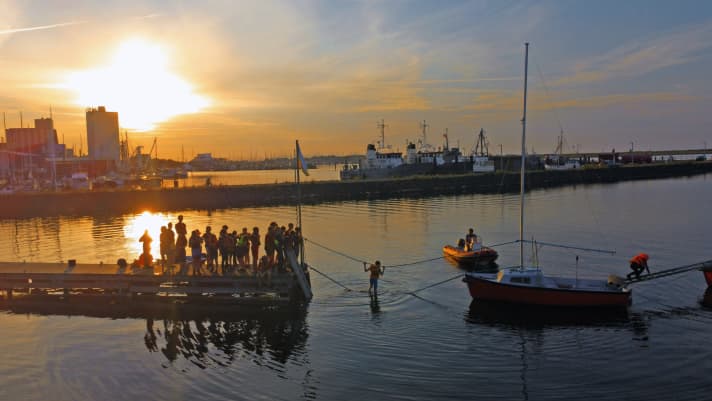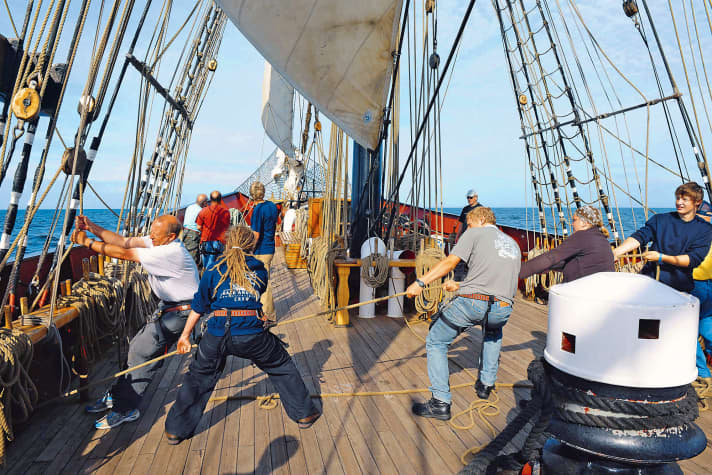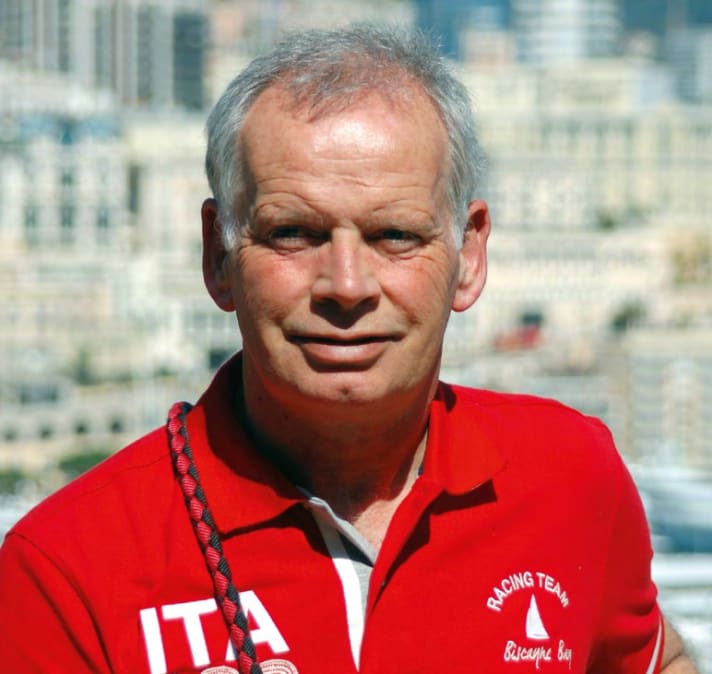Sailing camps: Pirate adventure, training camp or Atlantic round trip - sailing holidays for children and young people
Ursula Meer
· 02.06.2023





"Today you have to take your ID with you, we're travelling across the open sea to another country. Otherwise they won't let us in," says Walter Schroth with a serious face to the group of little girls and boys, who are standing on the jetty wearing caps and waistcoats and looking at him with wide eyes.
Over the last four or five days, they have been practising treasure hunts and water battles with their Optimists and dinghies in the small bay in front of the Bennewitz sailing school in Heiligenhafen in the finest pirate style. The water beneath them was shallow and clear, every blade of seaweed and stone recognisable. Perhaps they once ventured across the fairway to the Grasswarder, looking up respectfully at the sides of the large yachts coming into the marina from the open sea.
Sailing alone makes children grow
Today is the day on which they also set off on the big trip. Six nautical miles across to Orth on Fehmarn. The majestic bridge to the east, open sea to the west. Deep, dark water beneath them. A piece of cake for experienced sailors, but a huge adventure for the little sailing gang. Without mum or dad.
They had brought their children to the sailing school a few days earlier and were allowed to leave the camp, politely but firmly, along with their child's mobile phone. Perhaps with a lump in their throat, perhaps looking forward to a child-free week of power sailing or simply relaxing. Legitimate impulses and permitted wishes.
When children go sailing without their parents, they generally have nothing to worry about. Whether it's a fun pirate camp, a club training camp or a trip around the Atlantic lasting several months, parents can rest assured that their little ones will have grown up afterwards.
Nobody should lose the fun of sailing
Leon quickly runs to the toilet before boarding the two-man dinghy with his new sailing mate. 15 small boats - optis, dinghies and sturdy menhirs - set off one after the other under sail. The young sailors manage the trip over to Fehmarn alone; the sailing instructors and supervisors accompany the flotilla with several motorboats.
"We always check how they are doing. When the weather is fine, everyone is beaming, but if it's a bit rougher or a child is exhausted after hours of standing sailing in a calm, we take them into the motorboat. We don't want anyone to lose the fun of sailing here," explains their supervisor Walter Schroth.
For 20 years, he has been taking the little pirates for a week into this other world full of adventure, where they are taught everything about sailing in a playful way and a good portion of sailor's yarn is not to be missed during the lessons and the evening campfire on the beach. A musician and actor by profession, with a wild mane of curly hair and facial expressions that can change from angry to extremely sincere in a matter of seconds, he is the ideal cast for the chief pirate.

"But this is not the classic sport of sailing"
Despite all of his mischief, he and his more than ten team colleagues maintain the necessary seriousness, especially when it comes to the safety of the children. They have to be able to swim, wear waistcoats, complete capsize training and are never allowed on the water alone.
The Pirate World Cup takes place at the end of the week. 20 boys and girls scurry around the meadow through a course with a knot-tying competition and sailing quiz and race to sail a route that includes all manoeuvres and all courses to the wind.
"Walter, when is the exam?" asks Ole afterwards, his head red. "You've just passed it, here's your basic licence. A full licence!" he replies.
The most important thing for us is that the children come to sailing for fun and never lose the joy of it"
"If someone from the DSV saw us here with the wild little pirates, they would certainly think: This isn't the classic German sailing sport that you're doing here," Walter later realises with a grin. "But the most important thing for us is that the children enjoy sailing and never lose that enjoyment."
Sporty and focussed in the camps of the clubs and associations
The children's and youth camps organised by sailing clubs and associations tend to be more sporty and training-focused. "The early sports weren't that much fun," comments Johanna Salomon, who spent sailing holidays in Borgwedel on the Schlei between the ages of six and fifteen together with other young people from her club, the Mühlenberger Segelclub. She already knew most of the sailors and coaches from the club. So although the camps were away from home, they were in familiar surroundings. It may not always have been all sunshine and roses, "but even when someone was there who you didn't really like, we always got on well. I made friends there with whom I still keep in close contact," says the now 20-year-old.
In terms of sailing, there was plenty to do: twice daily regatta training on Optis, later on Lasers or 470s. Excursions and other programmes were secondary. "Every year, Johanna learnt more in this one week than she did during the whole summer during weekly training," says her mother Julia. It is no coincidence that a number of successful sailors have emerged from the ranks of the MSC, which also organises training sessions on Lake Garda in spring.
Although Johanna never had any great ambitions to compete, the independence she developed at the camps enabled her to help herself in some critical situations. For example, once when she drifted with her dinghy from the MSC in the Elbe river almost as far as Harburg and still managed to sail back on her own. The confidence that the children gain during the intensive training sessions can also help to reassure their parents.
Siebo Willms lets the children train in different areas
The children and young people from the Weser-Ems region have real training ambitions, travelling independently from Bremerhaven, Leer or the East Frisian Islands to the inconspicuous-looking Speichersee in Geeste, Emsland, to train with Siebo Willms and his daughter Nele in optis, teenies or 420s. They spend a weekend or even longer during the holidays at the Speichersee Emsland sailing club. It is unthinkable that their parents always accompany them, especially for those who come from the islands.
Willms has a clear stance on sailing without parents (see interview) and, together with the clubs in his region, does everything he can to give children and young people the opportunity to train in a wide variety of sailing areas. They can do their laps on Dümmer or Steinhuder Meer, taste the salt water in Greetsiel and on Borkum or start the training season early in Italy in spring. With some success, which he attributes to the fact that they have to cope independently and without their caring parents. And not least the parents without their children. For a week or two, missing each other will be limited.
Six months around the Atlantic with the floating classroom
A completely different dimension is reached when the teenage offspring board the "Roald Amundsen" to circumnavigate the Atlantic for six months. "One or two days before departure, my parents started crying," recalls Lukas Maxeiner at the start of his journey on the "floating classroom" from Spiekeroog's Hermann Lietz School. He was just 15 years old at the time. "But my parents always supported my sailing dream and in the end they were very happy and also a little proud."
Only those students who really want to go on the "Roald Amundsen" set sail. Safety training and a one-week trial cruise are undertaken beforehand, during which the young people have the opportunity to listen to themselves and the instructors also keep an eye on their suitability. This must be of a social and mental rather than a sailing nature. After all, a large traditional ship like this sails completely differently to a dinghy or your parents' yacht.

The two-master "Roald Amundsen", 50 metres long and equipped with 18 sails, became his home for six months. "The trip was a mixed bag in terms of interpersonal relationships," says Lukas looking back. Problems are inevitable when 30 teenagers, four teachers and the regular crew have to get along in a confined space for months on end, with lessons to attend and a ship to maintain. "We had to deal with confrontations, nothing was suppressed. Because if something doesn't go well, the ship and crew are in danger."
On board as teenagers, back on land as adults
A realisation that many young people only make at an advanced age. It's not for nothing that prospective travellers keep hearing the phrase: "You're going on board as teenagers and will return as young adults."
The young people return home as young adults - they don't realise it themselves, but others notice it on their return"
Lukas himself didn't notice this development en route; he and his fellow students were far too busy living in the here and now, exploring the Azores, Bermuda and Panama. In the middle of the Atlantic, constantly pushed along by the trade winds, they occasionally pondered quietly to themselves, perhaps thinking about their families back home while sitting in the yards, just as the sailors of old did. Or they were amazed to realise that the nearest land was 4.5 kilometres below them and yet they were safe as a community and on this proud old boat. Others realised on their return that they had also grown up, learned to tackle problems and see the world with different eyes.
There was hardly a conversation left in Lukas' head from the day he returned home. Of course, finally being able to hug his parents and see his friends again was a huge joy. But what he remembers more is the sadness that the trip with his classmates was over and that he no longer had any planks under his feet.
He still misses it today, six years after the trip. Yacht sailing is now a little boring for Lukas. His sailing ambitions know only one direction: back on the "Roald Amundsen", perhaps as early as this winter.
Interview: "They only learn by making mistakes!"

Mr Willms, do young people train better without their parents?
We have been travelling to Lake Garda for training for many years. The parents of the young sailors are often there for a little holiday or to watch the training - if they see anything, because on the large Lake Garda the small flotilla can quickly disappear around the next corner during training. In the past, the children would come back after hours and proudly tell their parents what they had experienced on the way. Today, every boat, no matter how small, is equipped with a tracker, and the parents sit in the café and watch the children's every move.
What's wrong with that?
The young sailors lose the independence that they are supposed to learn during the training weeks. If ambitious parents then transfer their goals to their children, we quickly end up with an elbow mentality, which for me has no place in sailing. Sailing is a team sport and should remain so. Children also quickly become an accessory when too many adults are present. If their view at the opening event for their own training and regatta week is blocked by the backs of adults, something is wrong.
So are you in favour of parents staying at home?
No, not necessarily, especially further away from home the smaller sailors are also happy when they know their parents are nearby. They are also a great help when transporting the boats and bringing them to the ramp. But parents also tend to take too much off their children's shoulders, protecting them from mistakes and disappointments. But children only learn and grow through their own mistakes. When the boat is at the ramp, the children do everything on their own in my training sessions: they set the mast, trim the boat and hoist the sails and sheets. In this way, they get to know their boat in every detail and can also help themselves on the way if something gets stuck.
We can't send children and young people onto the railway if they can't do it. To paraphrase Maria Montessori, "Help me to do it myself, but let me do it alone!" - that's my attitude. This is the only way children can understand their environment and conquer it for themselves. Mishaps are the starting point for learning the right way, so you have to allow mistakes. You can only sail with the elements and not against them. Children have to experience this for themselves.
But what if smaller sailors are overwhelmed?
Then people help each other. That's what sailing is all about: team spirit and mutual support. That's why I always try to bring teams of two of different ages together. When eight-year-old Franz sails with eighteen-year-old Lars, they both benefit: Franz can learn a lot, and Lars sees what he can already do - and realises that helping is fun.
Sailing holidays for children and young people
There is a wide range of sailing holidays for children and young people. A few examples show how colourful the possibilities are.
Youth travel
Many providers offer a wide range of supra-regional water sports - whether by flat-bottomed boat across the IJsselmeer, sailing language courses or simply getting a taste of everything that can be done on the water. You can find them by entering the search term "sailing" on the relevant page.
Sailing schools
Whether beginner or advanced, primary school pupil or teenager: sailing schools throughout Germany offer holiday camps where you can learn to sail on a wide variety of boat classes on inland lakes or the Baltic Sea. Some examples:
- DHH Yacht School Glücksburg: DHH.DE/SEGELKURSE/KINDER-JUGENDLICHE
- Bad Zwischenahn: DJH-SEGELSCHULE.DE
- Heiligenhafen: SEGELSCHULE-BENNEWITZ.DE/COURSESFORCHILDRENANDYOUNGPEOPLE
- Altefähr on the island of Rügen: SAILING-SCHOOL-RUEGEN.DE/EN/KIDS
- Gaienhofen on Lake Constance: SEGELCAMP-BODENSEE.DE/EVENTS/SEGELCAMP-WEEK
- Rostock-Warnemünde: SAILING-DELUXE.COM/PRODUCT/SUMMER-SAILING-CAMP
Sailing clubs
Youngsters can train in a sporty yet informal way at training camps, for example on Lake Garda, the East Frisian Islands or the IJsselmeer. Incidentally, some clubs' camps are also open to members from other clubs or regions. List of all member clubs and regional sailing associations at the German Sailing Association: DSV.ORG/DSV/ASSOCIATION/DSV-CLUBS
National sailing associations with their own programmes:
The clubs mentioned in the text on the net:
Sea and ocean sailing
Some clubs and organisations offer their young members and guests the opportunity to go sailing on sea-going yachts.
Youth cutter
For decades, the crew boat modelled on the navy cutters was the training vessel par excellence on the Elbe. Some clubs still rely on "the cutter".
Kiel sailing camp
The permanent camp on the Kiel Fjord is unique in Germany and offers a wide range of sailing holidays for everyone:
Sail training
- Sail Training Association Germanythe German umbrella organisation for instructors on traditional ships: STA-G.DE
- The brig "Roald Amundsen" of the "LebenLernen auf Segelschiffen" association: SAILTRAINING.COM
- Clipper Sailing Club, which manages the four ships "Amphitrite", "Seute Deern", "Albatros" and "Johann Smidt": CLIPPER-DJS.ORG
- The tall ship "Alexander von Humboldt II" of the German Sail Training Foundation: ALEX-2.DE
Learning under sail
The sailing classroom at the Herrmann-Lietz-Schule Spiekeroog:

